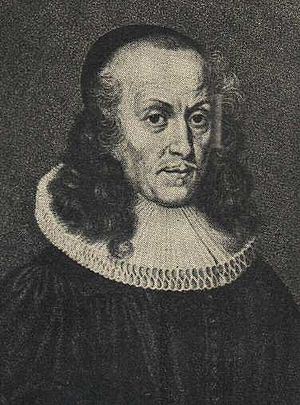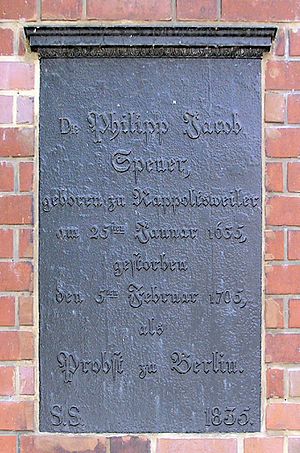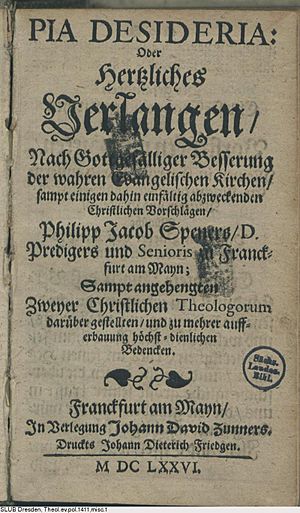Philipp Spener facts for kids
Quick facts for kids
Philipp Spener
|
|
|---|---|
 |
|
| Born |
Philipp Jakob Spener
30 January 1635 Rappoltsweiler, Upper Alsace, Holy Roman Empire
|
| Died | 5 February 1705 (aged 70) Berlin, Margraviate of Brandenburg, Holy Roman Empire
|
| Education | University of Strasbourg |
| Occupation |
|
| Movement | Pietism |
Philipp Jakob Spener (born January 30, 1635 – died February 5, 1705) was an important German Lutheran theologian. He is known as the founder of a religious movement called Pietism. People later called him the "Father of Pietism."
Spener wrote many books. His most famous works, Pia desideria (published in 1675) and Allgemeine Gottesgelehrtheit (published in 1680), came out when he was a main pastor in Frankfurt. Later, in 1691, he was invited to Berlin. Spener often disagreed with the traditional Lutheran teachings of his time. He also helped start the University of Halle. However, professors at another university, Wittenberg, accused him of having 264 errors in his beliefs.
Philipp Spener's Life Story
Spener was born in Rappoltsweiler, a town in Upper Alsace. This area is now part of France, but back then it was part of the Holy Roman Empire. After a short time at a grammar school in Colmar, he went to the University of Strasbourg in 1651.
There, he studied languages, history, and philosophy. He earned his master's degree in 1653. After his studies, he became a private teacher for two princes. He also gave lectures at the university. From 1659 to 1662, he visited other universities in Basel, Tübingen, and Geneva. In Geneva, his religious ideas became more focused on personal spiritual experiences.
Spener returned to Strasbourg in 1663. He became a preacher there and could also give lectures. Three years later, he was asked to be the main pastor at the Lutheran Church in Frankfurt. It was here that he published his two main books, Pia desideria and Allgemeine Gottesgelehrtheit. He also began the type of church work that led to the Pietism movement.
In 1686, he moved to Dresden to become the chief court chaplain. However, the ruler, Elector John George III, soon became upset. Spener openly criticized the way of life at the court. Spener refused to leave his job, and the government of Saxony didn't want to fire him. But in 1691, he was offered a new job in Berlin. He became the rector of St Nicholas Church and a church counselor.
In Berlin, Spener was highly respected. He helped establish the University of Halle in 1694. Throughout his life, Spener faced criticism from traditional Lutheran theologians. As he got older, more people opposed him. In 1695, the theology professors at Wittenberg formally accused him of 264 errors in his teachings. These conflicts continued until his death in Berlin.
Spener's Ideas on Faith
Philipp Spener was greatly influenced by other religious thinkers of his time. His own writings focused on how people could change their lives through spiritual rebirth and renewal. This idea of personal devotion and strong faith is why he is seen as a key figure in Pietism. Spener wanted to make the church stronger by helping its members become more knowledgeable and dedicated.
In his book Pia Desideria, he suggested six ways to improve the church:
- Read the Bible more: He wanted believers to study the Bible on their own and in small groups, not just listen to sermons.
- More involvement for everyone: He believed that regular church members should be more active in all parts of church life.
- Live your faith: He stressed that believers should not just know about God, but also put their faith into practice every day.
- Talk with kindness: He encouraged people to discuss religious topics with humility and love, trying to avoid arguments.
- Good pastors: He wanted to make sure that pastors were not only well-educated but also truly devout and spiritual.
- Focus on faith: He believed that sermons should help ordinary believers grow their faith.
These ideas show that Spener thought positive change in the church depended mostly on the active and devout involvement of individual believers.
Some historians say that Spener himself was not a "Pietist" in the strictest sense. This is because he didn't support some of the stricter practices that later Pietists followed. However, his ideas certainly encouraged the Pietist movement. He believed that a true theologian needed to have a spiritual rebirth. He also hoped that Jewish people would convert and that the power of the Papacy would fall before the church truly triumphed. He didn't demand a sudden, dramatic conversion experience. He also didn't push for Christians to completely separate themselves from everyday life.
Spener was sometimes thought to be the godfather of Count von Zinzendorf. Zinzendorf later became a leader of the Moravian Brethren. However, Spener was not Zinzendorf's godfather, even though Zinzendorf met Spener as a child.
See also
 In Spanish: Felipe Jacobo Spener para niños
In Spanish: Felipe Jacobo Spener para niños



